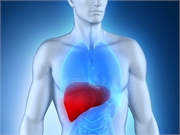Overall, progression-free survival longer with combo in unresectable hepatocellular carcinoma
WEDNESDAY, May 13, 2020 (HealthDay News) — Atezolizumab plus bevacizumab improves survival outcomes versus sorafenib in patients with unresectable hepatocellular carcinoma, according to a study published in the May 14 issue of the New England Journal of Medicine.
Richard S. Finn, M.D., from the Geffen School of Medicine at the University of California Los Angeles, and colleagues conducted a global, open-label phase 3 trial involving patients with unresectable hepatocellular carcinoma who had not previously received systemic treatment. Participants were randomly assigned in a 2:1 ratio to receive atezolizumab plus bevacizumab (336 patients) or sorafenib (165 patients) until unacceptable toxic effects or loss of clinical benefit.
The researchers found that the hazard ratio for death was 0.58 with atezolizumab-bevacizumab versus sorafenib at the time of the primary analysis (Aug. 29, 2019). At 12 months, overall survival was 67.2 and 54.6 percent with atezolizumab-bevacizumab and sorafenib, respectively. The corresponding median progression-free survival rates were 6.8 and 4.3 months (hazard ratio for disease progression or death, 0.59). Grade 3 or 4 adverse events occurred in 56.5 and 55.1 percent of patients who received at least one dose of atezolizumab-bevacizumab and sorafenib, respectively. In the atezolizumab-bevacizumab group, 15.2 percent of patients had grade 3 or 4 hypertension.
“These data are momentous, since they identify not only the first therapy to improve survival beyond sorafenib, but also the first successful combination regimen and the first positive randomized, phase 3 trial of immune checkpoint inhibition in this challenging cancer,” write the authors of an accompanying editorial.
Several authors disclosed financial ties to pharmaceutical companies, including F. Hoffmann-La Roche/Genentech, which partly funded the study.
Copyright © 2020 HealthDay. All rights reserved.








